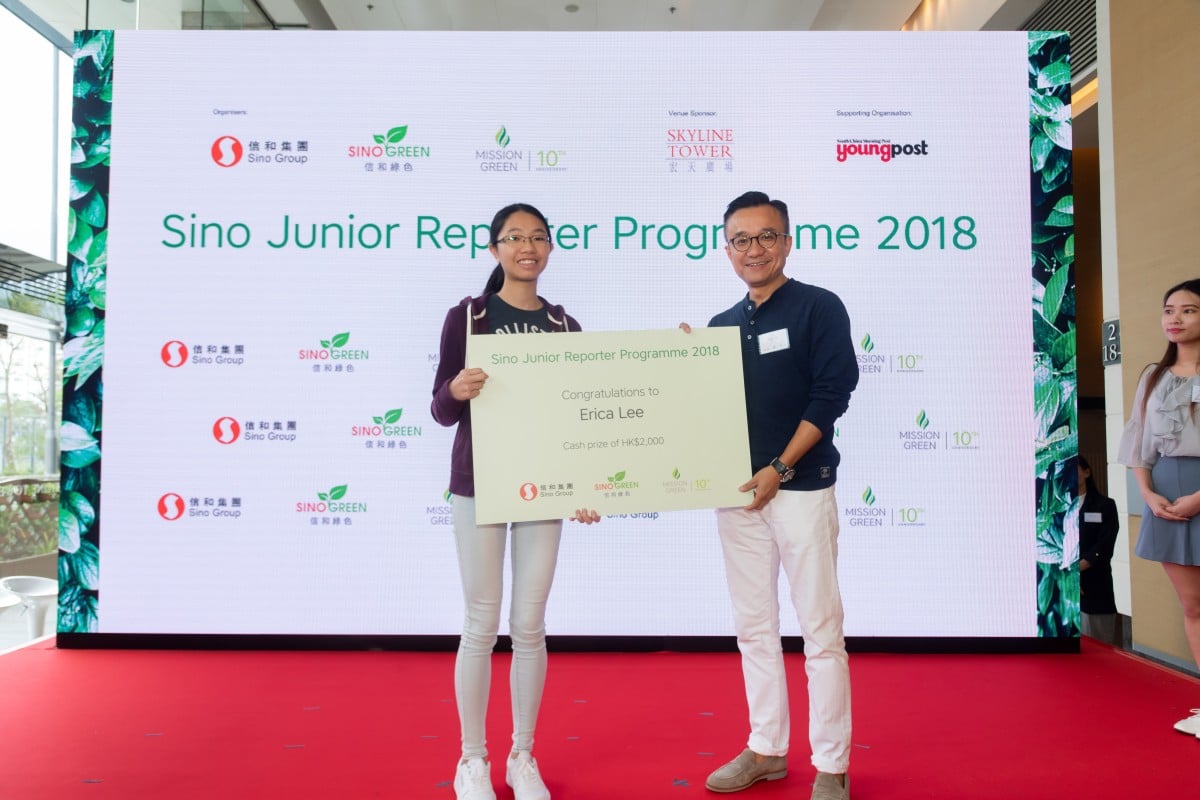
1st Runner Up: Is green living possible in HK, or is it just a dream?
 Erica Lee Tsz-ying receives her prize from Mr. Alexander Ng, Executive Assistant to the Chairman of Sino Group.
Erica Lee Tsz-ying receives her prize from Mr. Alexander Ng, Executive Assistant to the Chairman of Sino Group.Turning Hong Kong into a green city might not be as far-fetched as it seems. In fact, before green living became a trend in Hong Kong, both Sino Group and Sing Yin Secondary School have already been involved in sustainable development in their work environments.
Mission Green Top, an innovative programme initiated by Sino Group in 2008, offers trainees from Hong Chi Association job opportunities to garden on the roofs of the group-owned properties: the Skyline Tower, Exchange Tower and Empire Centre, allowing participants to sell their produce on a monthly basis.
Mr Sunny Yeung, Executive Director of Sino Land Company Limited who initiated the project ‘Mission Green Top’ said this cutting-edge idea was full of excitement and worth the investment.
“We all know that planting on the roof can lower the building’s temperature and save up energy. But instead of just growing some trees and some flowers, I want to do it even better. And I asked: Why don’t we create a rooftop garden and invite the disadvantaged to work with us?” he said.
This was the beginning of the collaboration with Hong Chi Association. Every week, trainees from the Association will go to irrigate plants, remove weeds and apply fertilisers on the rooftop garden. They will also take their products - tomatoes, lettuce and sweet potatoes and sell them at the lobby of the building.
This year, the urban farming and social integration project has marked its 10th anniversary and continued to be appreciated by the group’s staff members, building tenants and the community.
Last year's champion of the Sino Junior Reporter Programme
“Riding on the success [of Mission Green Top], we also launched two new programmes: ‘Mission Green Academy’ and ‘Mission Green Ambassador’. We hope that these programmes would further promote green living in Hong Kong,” Yeung said.
Meanwhile, Sing Yin Secondary School have been adopting similar approaches to embrace green living and environmental education on its school campus.
The school, established in 1970 and relocated to new campus in Choi Hung since 2011, has won several international green awards, including the Greenest School on Earth Award in 2013 and Green School Award in 2012 and 2017.
Principal Wong Chi-keung attributed the awards to the school’s green policies and the installations of green devices in the new campus.
On average, the school consumes 583,005 kWh of energy per year, of which one-eighth is generated by their green devices including wind turbines and sun-tracking solar panels.
The school also encourages its students to put in their best effort in promoting an eco-friendly environment and introducing green living to the people around them. “We have environmental monitors and prefects. Some students told me that they have become more aware of the environment and would bring green practices back home,” Wong said.
Wong has formulated green policies based on the well-known 3As conservation principle: Attitude, Awareness, and Action. He has added one more A (Atmosphere) for his school. He suggested that schools in Hong Kong should provide more opportunities for students to take part in such environmental movement.
“A good atmosphere helps change people’s attitude and raise awareness. It encourages them to take action to make Hong Kong a greener place,” he said.